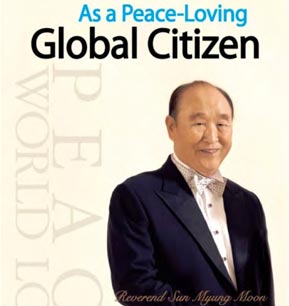ShareThis
Rev. Sun Myung Moon

As a Peace-loving Global Citizen is the autobiography of Rev. Sun Myung Moon, the founder of the Unification Movement. It was published in 2009 in both Korean and English by Gimm-Young Publishers of Seoul, South Korea. The book was released in South Korea on March 9, 2009 and debuted at #3 on the Businesss bestseller's list. It has ranked in various bestseller lists since then and was ranked 15th on the General bestseller's list as of October 14, 2009.
A Definite Compass for My Life
Great-Uncle Yun Guk, a graduate of Pyongyang Seminary and a minister, was an intellectual who was fluent in English and well versed in Chinese studies. He served as the responsible pastor for three churches, including Deok Heung Church in Deok Eon Myeon. He participated in the drafting of the 1919 Declaration of Independence, together with Nam Seon Choe. When it was found, however, that three of the sixteen Christian leaders among the signatories were associated with Deok Heung Church, Great-Uncle had his name removed from the list. Seung Heung Lee, one of the remaining signatories who worked with my great-uncle in establishing the Osan School, asked Great-Uncle Yun Guk to take care of all his affairs in case the independence movement failed and he died at the hands of the Japanese colonial authorities.
On returning to our hometown, Great-Uncle Yun Guk printed tens of thousands of Korean flags and handed them out to the people who poured into the streets to shout their support for Korean independence. He was arrested on March 8 as he led a demonstration on the hill behind the Aipo Myeon administrative office. The demonstration in support of independence was attended by the principal, faculty, and some two thousand students of the Osan School, some three thousand Christians, and some four thousand other residents of the area. He was given a two-year prison sentence and was imprisoned in the Eui-ju prison. The following year he was released as part of a special pardon.
On returning to our hometown, Great-Uncle Yun Guk printed tens of thousands of Korean flags and handed them out to the people who poured into the streets to shout their support for Korean independence. He was arrested on March 8 as he led a demonstration on the hill behind the Aipo Myeon administrative office. The demonstration in support of independence was attended by the principal, faculty, and some two thousand students of the Osan School, some three thousand Christians, and some four thousand other residents of the area. He was given a two-year prison sentence and was imprisoned in the Eui-ju prison. The following year he was released as part of a special pardon.
Even after his release, severe persecution by the Japanese police meant he could never stay long in one place, and he was always on the run. He carried a large scar where the Japanese police had tortured him by stabbing him with a bamboo spear and carving out a piece of his flesh. He was speared in the legs and in the side of his ribs, but he said that he never gave in. When the Japanese found they couldn’t break him, they offered him the position of county chief if he would pledge to stop participating in the independence movement. His response was to rebuke the Japanese in a loud voice: “Do you think I would take on a position and work for you thieves?”
Sunday, November 14, 2010
|
Labels:
A Definite Compass for My Life part2
|
CONTENT
- FOREWORD
- CHAPTER ONE - Food is Love
- CHAPTER TWO - A River of Heart Flows with Tears
- CHAPTER THREE - The Man with the Fullest Stomach
- CHAPTER FOUR - Why We Work Globally
- CHAPTER FIVE - True Families Create True People
- CHAPTER SIX - Love Will Bring Unification
- CHAPTER SEVEN - Future of Korea, Future of the Wor...
- CHAPTER EIGHT - Message for Young People

